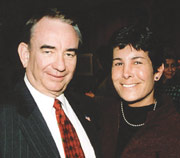Veterinarians take a lead role in agency responses to bioterrorism
|
As the federal government wrestles with the realities of potential bioterrorism threats, two veterinarians now serve as key advisers to the Bush administration on preparedness issues. Dr. Karen Becker, advising Department of Health and Human Services Secretary Tommy Thompson, and Dr. Curt Mann, advising Department of Agriculture Secretary Ann Veneman, work with the Office of Homeland Security to prepare for potential terrorist threats. Both are former AVMA Congressional Science Fellows. After Sept. 11, HHS Secretary Thompson pulled together an Emergency Command Center on Bioterrorism to deal with the aftermath of the World Trade Center and Pentagon attacks, and with the incidents involving the use of letters tainted with anthrax. The facility operated virtually around the clock for several months. During the first few months of Dr. Becker's tenure as special assistant to the deputy secretary of Health and Human Services, she operated out of the secretary's Emergency Command Center. Now Dr. Becker is part of the newly created Office of Public Health Preparedness, serving as the special assistant to HHS Deputy Secretary Donald Henderson. The office coordinates the department's response to public health emergencies. With $1.1 billion in grant money going to the states to build stronger systems of public health, Dr. Becker's office took only 21 days to get the preliminary guidelines for the money's use out to the states after the funds were appropriated. Dr. Becker said that a key part of the process involved close coordination with other government agencies to avoid duplication of efforts and to improve communication with the state and local governments that would rely on the money to improve their public health infrastructure. "At HHS and USDA, we have an unprecedented opportunity to strengthen our capacity to prepare and respond to public health emergencies," Dr. Becker said. "We now have the funds needed to recruit and train more professionals, upgrade infectious disease surveillance and investigation, enhance the readiness of hospitals, expand public health laboratory and communications capacities, and improve connectivity between hospitals, and city, local and state health departments to enhance disease reporting." "We aren't going to be able to fix our public health systems overnight," she continued. "But we need to start by focusing on short-term priorities, while staying focused on our longer term goal, which is to prepare our communities for whatever public health emergencies lie ahead." Dr. Mann has worked as special assistant to the Secretary of Agriculture since June 2001, when he came to the USDA. Following Sept. 11, the focus of his job shifted to coordination of agency efforts to protect against future attacks. "After September 11, there was a need to change the culture in government agencies to one that shares responsibilities and coordinates actions to address the concerns of homeland security," Dr. Mann said. "We have to make sure that things don't slip through the cracks." The USDA, which is the second largest government agency, is charged with preserving food safety and animal health, among many other responsibilities. USDA facilities such as the National Veterinary Services Laboratories, the National Animal Disease Center, and the Center for Veterinary Biologics in Ames, Iowa, play an integral role in diagnoses of potential disease outbreaks in animals as well as treatments. Many of the agency's activities intersect with work done by other federal agencies, so the challenge faced by the USDA involves communication not only within the agency but also with other government bodies, and with the public. Dr. Mann's work centers on building a structure within the USDA that can respond to possible attacks. This involves infrastructure changes and improved sharing of intelligence among government agencies. "Ultimately, we are creating a homeland security structure at the USDA that is an appendage of the [agriculture] secretary's office and that coordinates with [Homeland Security Director] Tom Ridge's office," Dr. Mann said.
Dr. Becker, who has also worked closely with the Office of Homeland Security, said that there was definite need for coordination between the HHS and USDA, particularly to ensure that a mechanism is in place to deal with potential zoonotic disease outbreaks. She sees veterinarians as critical stakeholders in efforts to strengthen our public health preparedness. "Veterinarians are trained to think in terms of populations, with an appreciation for economic cost," Dr. Becker said. "Human medical doctors not trained in public health have a more specialized, narrow perspective." "Being animal experts, veterinarians must play a leading role in dealing with new and reemerging pathogens, whether it is anthrax, smallpox, tularemia, plague, or some other public health threat," she continued. Both Drs. Becker and Mann said that the USDA and HHS have made massive changes as a result of the increased awareness of terrorist threats, and they recognize the need to share resources and open lines of communications within the government to prepare for and prevent future terrorist attacks. | ||
